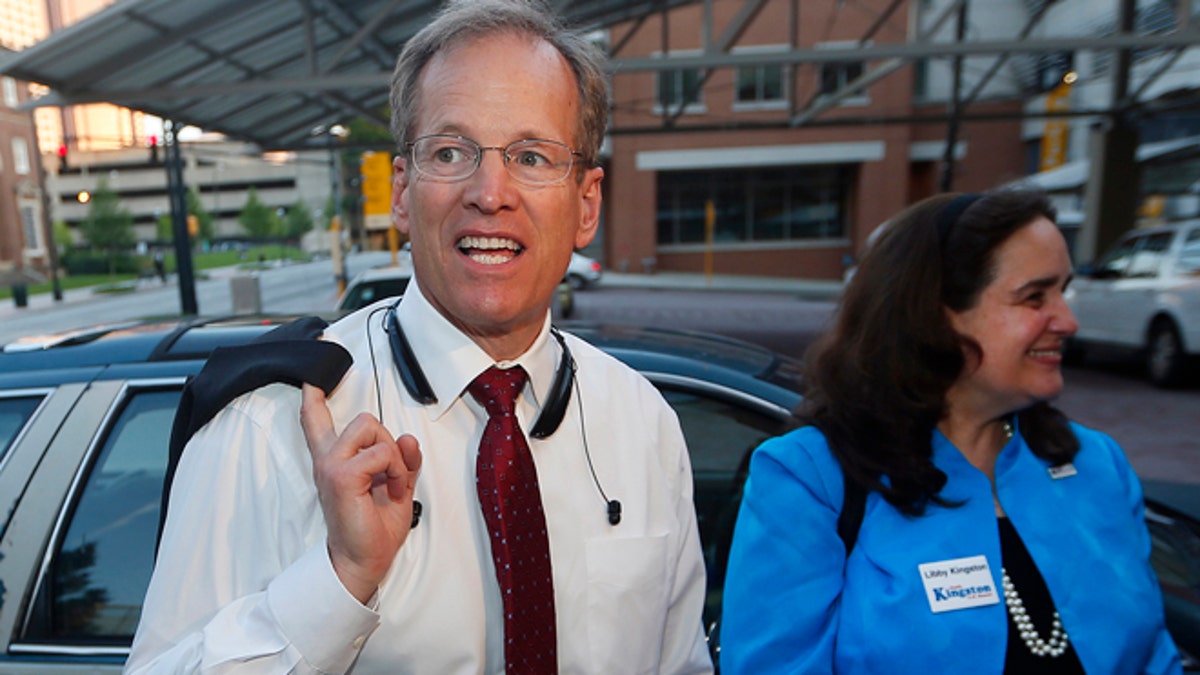
May 20, 2014: Georgia Republican Senate candidate Jack Kingston and his wife Libby arrive for an election-night watch party in Atlanta. (AP)
When Rep. Jack Kingston and former Dollar General CEO David Perdue advanced to a Republican runoff in Georgia's Senate race, the Tea Party was left without a favored candidate.
Yet the state's sizeable Tea Party crowd isn't staying on the sidelines. Tea Partyers now appear to be rallying behind Kingston, an 11-term congressman from Savannah who has the backing of the U.S. Chamber of Commerce and a history of supporting federal projects in his district. It's the pragmatic side of the Tea Party and says as much about the movement as it does about Kingston, whose voting record has been very conservative in recent years.
"We're more concerned with people's attitudes since the rise of the Tea Party," said Sal Russo, chief strategist of the Tea Party Express, one of the largest Tea Party groups in the country. His group has yet to endorse in the July 22 Georgia runoff.
The Georgia race is one of at least two instances in which the national business group and the Tea Party are finding common ground. The chamber and Russo's group also have backed Republican Rep. Steve Daines in his bid for a Senate seat in Montana, a key pickup opportunity for the GOP.
Nationally, Republicans are pushing for a net gain of six seats to claim a majority in the Senate and can't afford to lose the Georgia seat. Democrats have rallied behind Michelle Nunn, daughter of former Sen. Sam Nunn, and see her as one of their best chances to thwart GOP ambitions.
The Tea Party hasn't fared that well in early primaries this year, although those were largely uphill races against well-funded Republican incumbents.
And victories earlier this month by Tea Party-backed candidates in Nebraska and West Virginia Republican primaries are helping to reinvigorate the movement, which some had written off amid a difficult campaign season.
In Nebraska, the primary victory by Republican Senate candidate Ben Sasse should help his party in November retain the open seat -- he is immediately considered the favorite for the seat held by retiring GOP Sen. Mike Johanns.
In West Virginia, former Maryland GOP chairman Alex Mooney won the Republican primary with spending help from such outside groups as the Madison Fund, the Senate Conservatives Fund and Tea Party Express.
The Georgia race was a free-for-all and pitted three congressmen against Perdue and former Georgia Secretary of State Karen Handel. Handel and Rep. Paul Broun of Athens drew the most Tea Party support, with Handel carrying the endorsement of Tea Party favorite Sarah Palin and the Tea Party Express. Handel finished a close third, while Broun trailed in fifth.
In recent years, Kingston has moved steadily to the right with votes against raising the debt ceiling and a bipartisan budget bill. While campaigning, he points to a record of cutting spending as a member of the House Appropriations Committee.
Perdue's outsider message, of running against Washington and career politicians, would seem an easier sell with Tea Party activists seeking candidates willing to take on the establishment. But some of the first-time candidate's comments during the campaign may have set off alarms, and he faced sustained criticism as the front-runner in the final weeks before the primary. He won with 31 percent of the vote to Kingston's 26 percent.
In one instance, Perdue argued he didn't mean raising taxes when he said both spending cuts and increased revenue would be needed to deal with the nation's debt. Perdue said he was talking about efforts to grow the economy, but his original comment prompted the conservative group FreedomWorks for America to declare: "Elect a Conservative, Not Perdue."
Handel on Wednesday backed Kingston and urged her nearly 133,000 supporters in the primary to do the same. One of Handel's chief supporters, Julianne Thompson with the Atlanta Tea Party, also endorsed Kingston.
Perdue's campaign said the fact a few high-profile Tea Party activists are supporting Kingston doesn't mean rank-and-file members will fall in line.
The Associated Press contributed to this report.




